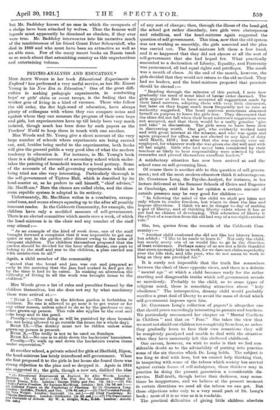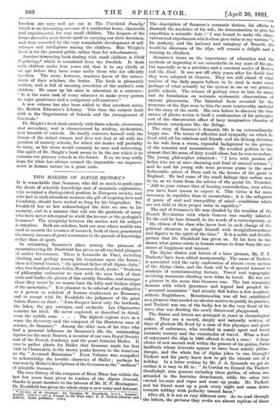PSYCHO-ANALYSIS AND EDUCATION.*
MISS • ALICE WOODS in her book Educational Experiments in England i has performed a very useful service, as has Mr. Ernest Young in his New Era in Education.' One of the great diffi-
culties in making pedagogic experiments, in conducting boys' or girls' clubs or scout troops, is the feeling that the worker gets of living in a kind of vacuum. Those who follow the old order, the flat high-road of education, have always plenty of colleagues with whom they can compare notes and against whom they can measure the progress of their own boys and girls, but experimenters have up till lately been very much isolated, though much has been done by such papers as the Teachers' World to keep them in touch with one another.
Miss Woods and Mr. Young give a short account of the very large number of schools where experiments are being carried out, and, besides being useful to the experimenter, both books will give the general public a very good idea of what the modem tendency in education is. For instance, in Mr. Young's book there is a delightful account of a secondary school which under- takes the painting of household wares for a local pottery. Some of the accounts of the self-governing experiments which are being tried are also very interesting. Particularly thorough is the self-government of Tiptree Hall, which is described by its head-master or, as he prefers to call himself, " chief adviser," Mr. MacMtum.3 Here the classes are called clubs, and the class- room republic system is adopted in its entirety.
Unfortunately, Mr. MacMunn writes in a combative, exaspe- rated tone, and seems always squaring up to the after all possibly innocent reader. In the Caldecott Community, for example, the children have only a modified measure of self-government. There is an elected committee which meets once a week, of which the head-mistress is in the chair and any number of the staff may attend As an example of the kind of work done, one of the staff brought forward a complaint that it was impossible to get any quiet or rest in the garden after dinner owing to the noise of rampant children. The children themselves proposed that the garden should be divided for the hour after dinner, one part to belong to the staff and one to the children, a plan earned out with satisfaction to all."
Again, a child member of the community " stated that the bread and jam was cut and prepared so early in the morning that the jam had soaked in and got dry by the time it had to be eaten. In making an alteration the difficulty of fitting in all the work was brought home to the children."
Miss Woods gives a list of rules and penalties' framed by the children themselves, but she does not say by what machinery these were arrived at :— " Ruiz I.—The well in the kitchen garden is forbidden to children. No one is allowed to go near it to get water or for
any other reason, unless asked to do so by the gardener or any other grown-up person. This rule also applies to the coal and coke heap and to the pond. Penalty.—Anyone doing so will be punished by close bounds (i.e. not being allowed to go outside the house for a whole day).
Ruin IX.—The donkey must not be ridden unless some grown-up person is present. Ruin X.—The trolly is not to be used on Sundays.
Rural XI.—No one is to slide down the backstairs' bannisters. Penalty.—To walk up and down the backstairs twelve times under supervision."
At another school, a private school for girls at Skelfield, Ripon, the head-mistress has lately introduced self-government. When she first proposed it to the girls in her house she found there was strong objection to the plan and so dropped it. Again in 1918 she suggested it ; the girls, though a new set, disliked the idea • (1) Educational Experiments in England. By Alice Woods. London : Methuen. 17s. ed. net.]—(2) The New Bra in Education. Edited by Ernest Young. B.Sc. London : George Philip and Son. (3s. ed.)—(3) The Child's Path to Freedom. By Norman Maclilunn. London : Bell. [2a. ed. net )- (4) Collected Papers on the Psychology of Phantasy. By Dr. Constance Long. London : Balllllsre. Tindall, and Cox. [10s. ed.net.]—(5) The Unrelated Family. By Vera Wright. London : Garrould. net.]--{8) Child PsYchal•all. By Ilhelm Rasmussen. London: Gyldendal. lid. oat I —(7) The Organisation and CUTTiculo of Schools. By 'W. A. Sleight, MA.. D.Lit. London : Arnold. Lac net.]
of any sort of change; then, through the illness of the head-girl, the school got rather disorderly, two girls were obstreperous and rebellious, and the head-mistress again suggested the question of self-government. This time, now that the old system was not working so smoothly, the girls assented and the plan
was carried out. The head-mistress left them a free hand, and it so happened that they did not choose at all the sort of self-government that she had hoped for. What practically amounted to a declaration of Liberty, Equality, and Fraternity was pronounced, all had equal rights and privileges. The result was a month of chaos. At the end of the month, however, the
girls decided that they would not return to the old method. They had no leaders, and the head-mistress propoled that proctors should be elected :—
" Reading through the minutes of this period, I note how gradually the need of some kind of better order dawned. The girls appear at first to have accepted all suggestions made by their head mistress, adopting them with very little discussion, but later on they began much more frequently not to vote as authority suggested. The head mistress sometimes absented herself on purpose to leave the girls free. They discovered that the skies did not fall when their head mistress's suggestions were not accepted, and that there would be a really genuine give and take ' in discussions. The girls seem to have been slow in discovering worth. One girl, who evidently worked hard and with great interest at the scheme, and who was again and again proposed for office, was not elected to any kind of duty until March, 1919 ; but after that she was scarcely ever un- employed, for whatever work she was given she did well and with all her might. Girls who had never been considered by their teachers as likely to bear responsibility were selected by their comrades and proved themselves excellent leaders."
A satisfactory situation has now been arrived at and the school runs on self-governing lines.
Of course there is another side to this question of self-govern- ment; not all the most modem educators think it advantageous. Dr. Constance Long, the Psycho-Analyst, for instance, in her lecture delivered at the Summer Schools of Civics and Eugenics
in Cambridge, said that in her opinion a certain amount of outside pressure may be very good for children :- " In following the mind of the child we shall get hints not only where to confer freedom, but where to draw the line and impose directions. I think we are in danger to-day of making a god of liberty, and of thinking liberty exists where it has as yet had no chance of developing. This adoration of liberty is the effect of a reaction from the old bad way of a too rigid external rule."
She, too, quotes from the records of the Caldecott Com.
munity:— ' " Another child confessed she did not like her history lesson, but added : I like to be made to learn it.' Not only the child, but nearly every one of us would like to go in the direction of least resistance. Perhaps many of us are not a little thankful that stern necessity bids us work, for we dare not claim superiority over the idle rich, and idle poor, who do not mean to work so long as they are provided for."
It is surely not impossible that the truth lies somewhere between the clash of these opposite views, and there is a definite " mental age " at which a child becomes ready for the rather startling and disagreeable truths which self-government reveals so mercilessly. Probably to the child, as to some types of religious mind, there is something attractive about " holy obedience." The introspective, dreamy child would probably sacrifice a great deal of liberty to avoid the mass of detail which self-government imposes upon him.
Dr. Constance Long's collection of papers4 is altogether one
that should prove exceedingly interesting to parents and teachers. We particularly recommend her chapter on " Mental Conflicts in Children " and that on " Fear." She takes the view that we must not shield our children too completely from fear, as unless they gradually learn to face their own sensations they will be completely paralysed and unable to deal with the situation when they have necessarily left this sheltered childhood.
One caveat, however, we wish to make is that we feel con.
siderable doubt as to the advisability of putting into practice some of the six theories which Dr. Long holds. The subject is too long to deal with here, but we cannot help thinking that, in tampering with some of the taboos which society has erected against certain forms of self-indulgence, these thinkers may in
practice be doing the present generation a considerable dis-
service. Half-truth, though better than darkness, may some- times be inopportune, and we believe at the present moment in certain directions we need all the taboos we can get. But these objections refer only to a very small part of Dr. Long's book ; most of it is as wise as it is readable.
The practical difficulties of giving little children absolute freedom are very well set out in The Unrelated Family,. which is an interesting account of a residential home, charitable and experimental, for vary small children. The keepers of the home showed a most heroic spirit in carrying out their doctrines, and were rewarded by the very remarkable development of self- reliance and intelligence among the children. Miss Wright's book is for the general public rather than for schoolmasters.
Another interesting book dealing with small children is Child Psychology,° which is translated from the Swedish. It deals with children under four years old, that is to say chiefly at an age before they have come under those who are officially teachers. The more, however, teachers know of the antece- dents of their scholars, the better. The book is pleasantly written, and is full of amusing anecdotes of the author's own children. He sums up his aims in education in a sentence : " It is the main task of every eduCator to make every person an eager questioner and a competent self-answerer."
A new volume has also been added to that excellent series, the Modern Educator's Library. This time the subject dealt with is the Organization of Schools and the Arrangement of Curricula.7
Dr. Sleight's book deals entirely with State schools, elementary and secondary, and is characterized by wisdom, moderation, ard breadth of outlook. He hardly concerns himself with the doings of the infant classes, and dces not deal at all with the question of nursery schools, for which the reader will probably be sorry, as his views would certainly be sane and interesting. The spirit of Dr. Sleight's book seems to be the one which is to animate our primary schools in the future. If so, we may really hope for what has always seemed the impossible—an improve- ment in human nature on a great scale.



































 Previous page
Previous page